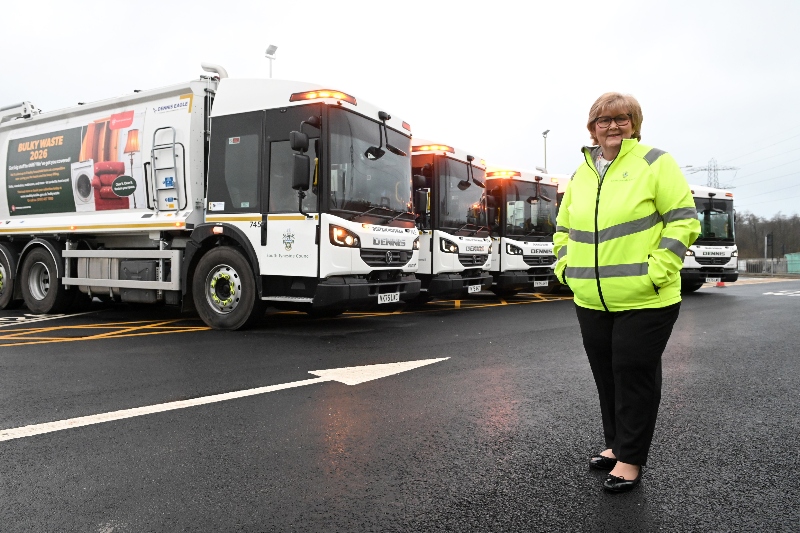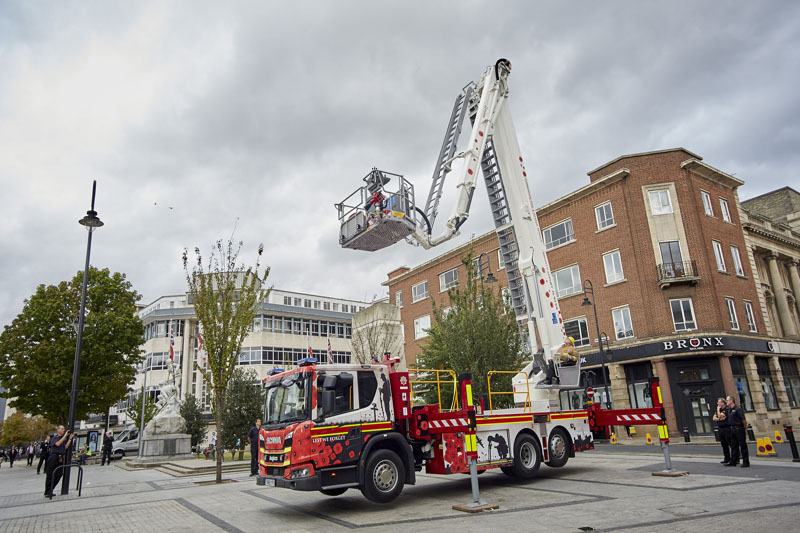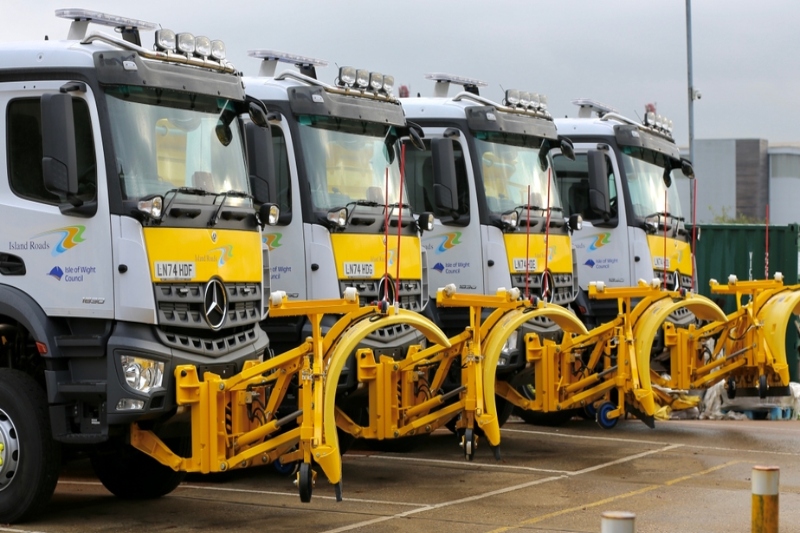Ann-Marie Knegt visited Widnes to speak to Sid Sadique and Russell Markstein from Riverside Truck Rental,who believe that applying business models from private industry to Local Authority fleet management is the only sensible way forward. However, in order to succeed, major culture change is required.
The face of the market has changed completely over the last couple of years,” says Sid Sadique, MD of Riverside Truck Rental. Russell Markstein, Development Director for the Widnes-based company, wholeheartedly agrees with this point of view.
“We could have curled up in a ball during the recession, and made the cuts as most have done. Instead we just worked harder to get business. In the end, we even ended up recruiting extra staff.
Although we have faced some bad times, we can now safely say that recovery is ongoing in private and public sector hire, as we now have 19 million pound's worth of capital equipment on order for nearly all contract hire,” comments Russell.
Riverside Truck Rental might be known for its primary function as a truck rental company offering contract hire services to Local Authorities and private contractors.
However many are not aware of the fact that the company counts the largest contractors in the country as its clients ' BIFFA, Veolia and Viridor ' and that Riverside offers total fleet management solutions, workshop and tyre management services, as well as vehicle refurbishment and painting services. “We now operate seven depots all over the country and aim to look further than 'receiving the cash and handing over the keys' as is shown by our involvement in the Lancashire County Council Waste PFI,” explains Sid.
The Lancashire Waste PFI is the UK's most groundbreaking waste project, worth £2.3bn over 27 years, and has served as an example for other waste facilities in the country. The Lancs PFI consists of two high-tech facilities, one in Leyland near Preston and one in Thornton (near Blackpool), which are responsible for treating 300,000 tonnes of household waste per annum, reclaiming recyclables for reuse and transforming the organic matter into a high quality compost, called Organic Growth Medium, which will be used to replant 2.5m trees over the course of the contract.
Looking further
Because Sid has spent many years working for BIFFA, he has considerable experience in the waste industry, and is able to look beyond the vehicles alone. He was asked to be involved in this project at a very early stage.
In a nutshell, the PFI contract was awarded to a company called Global Renewables, and the waste processing plant aims to become power neutral by extracting methane from organic waste water and turning this into compressed natural gas.
Sid explains that Riverside became involved in the design of the plant, after it was asked to look at the operational requirements for waste machinery and trucks. “It is not about the truck, but it is about the operation. If you know what an anearobic digestion plant does, and how a recycling plant works, and you understand the operational pressure points, it is straightforward to build a suitable vehicle and plant package around that. I believe that we are the only rental company that is able to so. We always step into a contract, look at the operational requirements, and then tailor around these and add value.”
Riverside currently has around 70 vehicles and plant in operation at the Lancs PFI, and has a mobile van service visiting the site every day. This service has been subcontracted to a local DAF dealer, but it is co-ordinated via Riverside's service desk, and it includes out-of hours maintenance. “Since we are using DAF waste machinery in the facility, it made sense to use a local agent,“ Russell underlines.
Since its involvement in the Lancashire PFI, the company has been involved in other PFI initiatives all over the country, such as in the Mersey PFI (Veolia), the Isle of Wight PFI (BIFFA) and the Cheshire PFI (Viridor). Sid and Russell became involved in the Cheshire initiative before the contract was even won. They sat down with the Viridor team in charge of the response to the tender, and looked at the transport flows and worked out the conceptual costs, which were then successfully used in the bidding process.
Sid believes that Viridor benefited greatly from this, as the contract was awarded after the transport plan had already been developed. “We have a long term relationship with all our suppliers and clients, they are partners to us. We find that the current tender process in the transport industry has become a matter of looking at the cheapest price and ticking boxes.
We want to add value and create innovation, and we are happy to carry more risk, as this company is owned by myself and the directors, and we are not restricted by a large PLC. We are not afraid to make decisions. Driving best value and best practice should not be about ticking boxes and prices. In other areas of industry there is a competitive dialogue during the tender process and this creates operational savings, and more efficiency in the end result.”
He continues to say that while this might be quite complicated on smaller deals, on larger contracts it enables people to come up with ideas, and current vehicle tendering doesn't leave room for innovation.
“If all bids are looked at in a different way to create the most competitive package, this would create a package for Local Authorities and contractors that is ideally suited to them, because of the operational experience gained in other areas,” says Sid.
Russell adds that due to the pressure faced by Local Authorities, there is a shift towards externalizing workshops in the UK. This is mainly driven by the fact that fleet is becoming older.
Because organizations are not making decisions to replace vehicles, it means that the value of maintenance has gone up. “There is no logic, there are no demographics, or geographics, but what we have seen is that in four out of five of the latest tenders for the provision of vehicles, there was a request to externalize the workshop. This is a new development.
“A workshop is seen as a low profile service, because it is an “unseen” by the public. However, it has a high-profile impact when vehicles go off the road and the waste is not collected. Many district councils all have their own workshops, but why don't they work together and create efficient workshops that operate 24/7? There has always been an acceptance that when vehicles go off the road, the answer used to be to simply hire a spare. Now the pressure has increased on LAs to become more efficient and cost effective.
However, working practices and culture have not moved forward with the times. Many LA workshops open the same time as the refuse collection department, coming in at seven and leaving at four. In order to save money and prevent downtime, it is essential to have a depot running 24 hours a day and seven days a week,” comments Russell.
Social enterprise
Most of Riverside's workshops are backed by a Local Authority, and are servicing LA contracts. The company is also pioneering a concept that could take Local Authorities into a new way of operating, called the social enterprise. This is a model in which Riverside invests in staff, resources, premises and apprentices from the local area, producing a working business model for a joint venture between Riverside and the council. This is all geared towards investment back into the authority, enabling it to deliver real savings without it having to cut frontline services in other areas
During this scheme, the Council's facilities will be run as efficient, commercial facilities, which deliver higher service levels, and reduce overall vehicle downtime. Riverside buys out shares from the Local Authority and there is a cash revenue built into the business plan.
“The number of landfills is reducing, and the number of recycling facilities is increasing, and with the spending cuts private contractors are encouraged to step in. We can get everyone together and make use of under-used facilities, and provide the levels of service that are required. I cannot understand why we have 10 different councils in Manchester, for instance, and all of them have different ways of operating, with their own fleets, and their own workshops.
If we joined them all together and created one common service, there would be huge savings to be made in operation, and you could place the depots in strategic locations and use fewer vehicles. Five large authorities could be managed by two or three depots,” explains Sid.
Acquiring funding
Now that waste treatment facilities are becoming the norm, it will also change the way vehicles are procured. It is the type of disposal facility that dictates which type of RCVs and plant are required, and the choice is now being taken away from the fleet manager, and this is a total reversal of what the industry used to be like.
Securing funding as a contract hire company is quite difficult at the moment. As a symptom of the recession, banks are not readily prepared to lend money, says Sid. “However, because we have a consistent track record, without ever defaulting on payments, we have no issues receiving loans to secure contracts. Also consistency in keeping the same suppliers provides Riverside with extra flexibility and a more relaxed attitude in pricing, because we have gained trust from all parties involved by creating established relationships.
“We even get involved in design meetings with the vehicle manufacturers, as there is an ongoing design discussion between fleet managers and vehicle builders. We tell them our exact opinion, because without honesty and transparency, there is no progression,” concludes Sid.






